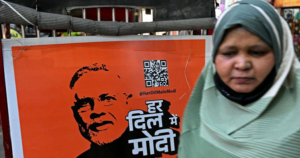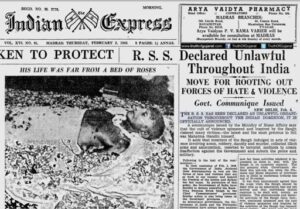It was heartwarming to see Hrithik Roshan publicly embracing Aryan Khan, son of his colleague Shahrukh Khan. Ironic too, because Hrithik Roshan was sought to be projected by Hindutva groups as as the ‘Hindu’ response to the Khans of the film industry after the success of his debut movie in 2000. But more about this later.
The persecuted Aryan has been reduced to the single identity of being the son of Shahrukh Khan, one of the top three superstars of Bollywood. The other two also bear the Khan name. The story of the three Khans is an important episode in the ongoing, serial targeting of Muslims in India.
The public humiliation of one of the most sought after Muslim men in India makes a good political spectacle. It actually satisfies the injured manhood of those who suffer from a sense of sexual inferiority when they compare themselves with Muslim men. For them, nothing can be more satisfying than rubbing in the dust the nose of a Muslim star who has been the heartthrob of many Hindu girls and women for three decades.
It would sound absurd to rational people but this sexual jealousy against Muslim men has been stoked by the ideology and politics of the Bharatiya Janata Party and its parental organisation, the Rashtriya Swayamsevak Sangh (RSS). To be fair to them, this inferiority complex is not confined to these organisations alone. The image of a virile, sexually powerful or more attractive Muslim man has long tormented the mind of ‘Hindu nationalists’. The arguments put forward by V.D. Savarkar for the martial and military training of Hindus also betray the same mindset. He felt that Muslim men could easily be trained militarily while Hindu men would need longer training as they have been emasculated by the practice of non-violence for centuries. Physical strength, manliness and violence are strangely entwined in the mind of Hindutva ideologues.
Buddha and then Gandhi were blamed for robbing Hindu men of their sexuality. The presence of Muslim men made matters worse for the ‘Hindu nationalists’. The fear that “their” women might fall for the sexual prowess of Muslim men prompted a campaign – through booklets and pamphlets published more than 100 years ago – about the need to “protect” Hindu women from this “danger”. This literature warned Hindus that Muslim men were ‘on the prowl’ and that Hindu women were in danger of being lured by them. This Hindutva mission to save Hindu women from the conspiring Muslim men continues to this day. The ridiculous bogey of “love jihad” testifies to it.
I recall a discussion some years ago on a TV channel in which a representative of one of the affiliates of the RSS claimed that Muslims ‘prepare’ handsome Muslim boys with athletic bodies and send them out to trap gullible Hindu girls. I sympathised with him and asked why was he suffering from an inferiority complex. Surely even Hindu boys and men are attractive enough to be loved, I said!
In 2007, a lawyer friend in Ahmedabad told me that there was a campaign to open gyms for Hindu boys and men as they had to compete with athletic Muslim male bodies. A leading Gujarati novelist told me that well-built Muslim young men were sent to girls’ colleges with motorbikes to trap innocent Hindu girls. The motorbike here apparently represents ‘masculinity’.
In 2000, soon after the box office success of the movie Kaho Na…. Pyaar Hai, Hrithik was sought to be presented as the response to the Khans reigning over the Bombay film industry. Panchjanya, the unofficial mouth organ of the RSS even published an article that year batting on behalf of Roshan, blaming the underworld for seeking to destroy his career. It suspected that there were stars working against Roshan. It said that the underworld mafia was forcing producers to hire Muslim actors.
Later, defending the article, the then editor Tarun Vijay said that there was nothing communal in the article. His paper was only warning against the influence of the mafia in the industry. But the message was very clear: Muslim male actors were being imposed on the film audience by the Muslim mafia. Also that they were promoting certain drinks which were becoming popular at the cost of Indian drinks.
Later in 2020, the paper again attacked Amir Khan for being a beloved of the Erdogans, serving the cause of anti-Indian forces and pitched actors like Akshay Kumar and Ajay Devgn against them, praising them for their nationalisitic fervour.
Hrithik Roshan disappointed the Hindutva groups. He could not dislodge the Khans, nor could other Hindu male actors do it. They could not match the appeal of these Khans. It is also irritating for the RSS fraternity to see the weakness of Hindus who cannot resist the charm of these Muslim stars. These stars are used as promoters or ambassadors by many well-known brands. In the eyes of the Sangh, the market was also promoting and patronising Muslim masculinity. This needed to be stopped. The fact that Hindu women married these Muslim stars added insult to injury.
In the past 20 years, we have seen multiple public campaigns by the followers and affiliates of the RSS to malign and defame these three stars. Amir Khan and Shahrukh Khan have been made special targets as they also have a public persona apart from their cine presence. Amir Khan’s support to the Narmada Bachao Andolan or his direct and indirect support to other social causes adds to his appeal. Shahrukh Khan has also spoken out and is seen to be reluctant to join those in Bollywood who cheer for the ruling establishment.
One needs to understand the frustration of the RSS fraternity with Bollywood. Despite Partition and the displacement of Muslim influence from public life in many areas, the Bombay film industry proved to be an outlier. It continued to be dominated by Muslim and non-Hindu producers, directors and script writers. What can be worse than all actors aspiring to be like Yusuf Khan a.k.a Dilip Kumar? Even the stardom of Amitabh Bachchan was scripted by two Muslims, Salim and Javed. Bachchan endeared himself to the ruling establishment once but is now past any age to compete with the Khans. Also, despite having the aura of a superstar, he could not develop as a social role model for the youth. People saw him getting petty and pettier, touching the feet of the Sahara promoter , then getting patronised by Amar Singh and Mulayam Singh and finally singing paeans of Narendra Modi.
The RSS is keen to capture Bollywood as it shapes the popular imagination of ordinary Indians. The Muslim imprint on Bollywood is so pronounced, however, that without demolishing the whole edifice, it is difficult to erase it. Another influencer is Urdu. It is impossible to imagine Bollywood without Urdu. The youth listen to songs written, composed and sung by Muslims which are nothing if not Urdu. Sharpness, turns of phrase, sublimity, poignancy, sophistication, refinement, humour, sarcasm are qualities which come so easily to Urdu. Dialogue writers still crave to reach somewhere near the grandeur of the dialogues of Mughal-E-Azam. Or Pakeezah or Bazar. Although there has been a perceptible change in the nature of language now used by Bollywood, Urdu continues to exert it influence.
That is one reason why Urdu is sought to be used by companies like Fab India in advertising campaigns. To communicate a sense of elegance and class, which only Urdu can give. The calligraphic impact of the script also needs to be kept in mind. So, while writing Jashn-e-Riwaj in Roman, the designer attempted to bring a sense of gracefulness by giving it the calligraphic touch of Urdu.
For the Sangh, it is intolerable that even Hindu festivals are shadowed by Muslim/Urdu presence. The RSS project is as much cultural as political. The recent outburst of a BJP MP against Amir Khan advising people not to burst crackers on Diwali has to be seen in this light. How can a Muslim interfere with the practices of a Hindu festival. This politics will not rest until it has rubbed off all Muslim influences. So, the image of Shahrukh Khan has to be destroyed using a bizarre charge of ‘conscious possession ‘of drugs, even if nothing was found on the person of Aryan Khan. Similarly, Urdu needs to be pushed out of the public consciousness using all kinds of canards against it.
Urdu evokes a jealousy similar to what the Muslim stars produce. It then needs to be made responsible for Partition, flogged for the presence of words from Persian and Arabic origin and hated for having been patronised by mostly Muslims after Hindus and Sikhs distanced themselves from it.
Urdu reminds you of Muslims, these actors delude you into thinking that Muslims are loveable. Monuments like the Red Fort, Sidi Sayyed ni Jali, Humayun’s Tomb, etc make India and Muslims inseparable. The Indian imagination has to purged of all these pollutants. So, all Muslim monuments – from a relatively unknown (before the 1980s) Babri Mosque to the Taj Mahal to the Qutub Minar – need either to be demolished or remodelled in Hindu colours. Urdu and Shahrukh Khan are living monuments. They have to pay the price for being who they are.
(The author teaches at Delhi University. Courtesy: The Wire.)




